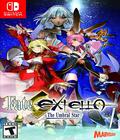Buy Fate/Extella: The Umbral Star
If you're a Switch owner who's also a fan of Musou-style gameplay, then you're anticipating the release of Fire Emblem Warriors later this year. After seeing what Omega Force could do by mashing up a beloved Nintendo franchise like The Legend of Zelda with its own brand of large army action, there's little doubt that its latest endeavor would bring about similar results. If you'd like another Musou-style game to tide you over, XSEED and Marvelous have brought Fate/Extella: The Umbral Star, a complete version of the same game that was released last year on the PS Vita and PS4.
The story takes place after the events of the Holy Grail War, where you and your servant have been victorious. As the new rulers of SE.RA.PH, you're trying to keep the peace in the Moon Cell's world when you're suddenly felled by a giant monster. You awaken with amnesia, and during a routine mission to jar your memories, you run into Caster Tamamo, who rules over SE.RA.PH and claims half of the world for her own. She also happens to have a doppelganger of you by her side, causing more confusion since only one copy of you should exist in the world. It falls on you, Emperor Nero, and your band of loyal servants to restore order to the world.
Truthfully, the story caters to those who are already familiar with the series. The game should be applauded for at least trying to get newcomers up to speed with preceding events, as the convenient amnesia plot fills in a good number of past details. Still, there's enough here to confuse people from the get-go, and since it takes a while to reach the helpful bits, you'll be perplexed for some time.
That being said, the plot and lengthy exposition feel like a typical anime game, but you get the sense that the game can't get away from its visual novel roots. It's very heavy with cut scenes that blend together in-game graphics and illustrations, so it doesn't immediately seem like a visual novel. However, there's plenty of dialogue, and a good deal of it can be risqué due to the emotional shifts between the protagonist and your servant. Serious moments give way to bouts of blushing. Depending on your feelings about Japanese visual novel games, it can either be endearing or jarring. At least there's a purpose to the scenes, as your choices increase your bond with one another and open up other abilities along the way, like defensive and offensive buffs.
Once you get into the action segments, you'll immediately recognize the all-too-familiar Musou style of gameplay. Every small battlefield pits your warrior against an expansive horde of enemies who are waiting to be mowed down. On occasion, you'll face a strong mini-boss or another servant who you have to defeat to end the skirmish. You'll start off with a small combo set, but leveling up grants buffs and expands your library of light and heavy attacks.
What's interesting is that the game changes one of Musou's big mechanics: territory control. The goal in each battle is to gather enough keys to bring out the main enemy servant so you can engage in the level-ending boss fight. Keys are obtained by taking over territories, each one differing in value. To take over territories, you need to lure out their guardians, and that requires you to kill many, many soldiers. That's where the big difference lies, as other Musou-style titles already have guardians sitting at the base, allowing you to take them head-on instead of trying to coax them out first. Of course, other elements make this task more difficult to complete. Allies on the field often call for your help, and previously conquered territories are always at risk of being retaken by the enemy. With your failure tied to losing keys via losing territory, each battle becomes a race to the key and a tug-of-war to ensure you don't lose what you already have.
One thing you'll notice right away is how fast and action-packed Fate/Extella tries to be. Part of that is reflected in your move set, which emphasizes high mobility or mass destruction, sometimes both simultaneously. Your regular moves consist of fast dashes and swipes that cover a wide arc, so you're always hitting something. Build up a meter, and you can unleash a special transformation that augments your current stats and makes more moves available. There's another meter that governs a screen-clearing combo, and the meter has multiple segments. Activating the move at different segments adds more damage, so you can determine how small or massive it can be.
Another element that makes the title feel fast is the game design, which cuts out a good deal of restful moments. The levels are self-contained battlefields, so you don't have to chase down anyone who's trying to run away. Whenever you need to reach another battlefield, you don't have to walk down a corridor or pass through empty expanses of land. Instead, you simply go to a portal and initiate a warp. You'll either hit the next battlefield or go to a hub where you choose another warp gate and go from there. As a result, you spend less time traveling from one spot to another and more time fighting.
The non-stop action can be a boon for those who enjoy Musou-style action. There's never a shortage of enemies to kill, and it only takes a few steps and level warps before you're thrust into the thick of things again. At the same time, the design can be a curse, since it gives you little time to breathe. Even when you encounter the junction points that act as stopgaps between the battlefields, the constant threat of previously conquered lands being invaded means that even taking a small break could lead to losing territory. The endless destruction of enemies can grow tiresome, since you can get into a lull. Luckily, the portable nature of the Switch lets you play in short bouts, which seems to be the best way to approach the title.
There's quite a bit of content in the game beyond the main campaign. Finishing up the campaign with Nero allows you to unlock two other characters, Altera and Tamamo, so you can experience the story events again from a slightly different perspective. There are a number of side missions to undertake with different servants, and free battle mode lets you pit one servant against another. The latter isn't the most engaging mode, but it's a nice touch since the servants have different abilities and fighting styles. All in all, there's enough here to make up for the absence of a multiplayer mode.
As with many anime titles, the sound in Fate/Extella is just fine. The music is perfect for action, but it also skips out on the overly dramatic or silly once the cut scenes make the sharp tonal turn. The voices are all in Japanese, and as expected, the cast performs its roles perfectly. The only disadvantage is that the characters often say things during their transformation sequences, and there are no subtitles. You'll get the gist of the war cry, but it would've been nice if you knew what was being said.
Graphically, the Switch iteration comes fairly close to the PS4 version of the game. All of the characters have a nice cel-shaded style, clean textures and nice animations. The moves come with the appropriate amount of flash, where nothing looks mundane. The battlefields start to blend together in one stage, but each stage takes you somewhere new, so it feels like there's some progress. You're fighting only four enemy variants, but that means the game can pack in a ton of enemies on-screen. More importantly, the game does this while holding a steady frame rate that doesn't quite hit 60fps but appears a little higher than 30fps. As a result, the Switch version easily bests the Vita in terms of being the better portable iteration of the title.
In the end, Fate/Extella: The Umbral Star serves as a good appetizer for those who want some Musou action now. The action goes at an almost non-stop clip, and there's rarely any time to breathe before you have to unleash triple-number combos again and again. There's a ton of content to go over, and while the story can be nonsensical at times, it remains entertaining for those who aren't averse to anime or a visual novel style of game. Overall, Fate/Extella is a solid game to bide your time with while you await some of the bigger titles this year.
Score: 8.0/10
More articles about Fate/Extella: The Umbral Star











 Players experience the story of Fate/Extella: The Umbral Star from the independent perspectives of the three heroine servants and face foes from a variety of Fate productions.
Players experience the story of Fate/Extella: The Umbral Star from the independent perspectives of the three heroine servants and face foes from a variety of Fate productions.







































